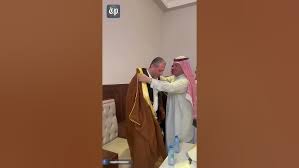The recent appearance of Jamal al-Sharaa, brother of Syrian President Ahmed al-Shar’a, alongside Minister of Culture Mohammed Yassin Saleh in Deir ez-Zor has sparked widespread public outrage—particularly because the meeting took place at the home of Sheikh Farhan al-Marsoumi, a figure widely accused of drug trafficking and close ties to pro-Iranian militias.
Although the Presidential Office issued a statement clarifying that Jamal al-Sharqa holds no official position within the state and that his presence was strictly personal, the announcement failed to stem the wave of criticism. On the contrary, it intensified ongoing concerns about the role of the President’s family members in public life and the extent of their informal influence within the corridors of power.
Photos of the meeting circulated quickly across social media, with activists denouncing what they described as the “new state’s normalization with symbols of corruption.” The presence of the President’s brother at an event involving a government minister and a controversial figure prompted sharp questions about whether members of the ruling family are exerting behind-the-scenes influence without any formal authority.
The incident has reignited debate over the involvement of the President’s siblings in state affairs, echoing fears of a return to familial rule—one of the very patterns that Syrians rose up against in the past decade. In this context, observers recalled the earlier appointment of Dr. Maher al-Sharaa, another brother of the President, to the influential post of Secretary-General of the Presidency—a role seen as central to coordinating presidential directives and shaping high-level policy.
Several human rights advocates view these developments as a troubling signal of the re-emergence of familial governance, albeit in unofficial form. They warn that such moves risk undermining the principles of transparency, accountability, and institutional separation that the new Syria is supposed to uphold.
While the Presidential Office sought to ease public concern by reaffirming the principle of equality before the law, many observers contend that the statement fell short of providing meaningful reassurance. Instead, it revealed the lingering fragility in the relationship between the presidential family and the state—and underscored the sensitivity of Syria’s ongoing transitional period.
In this climate, the new leadership in Damascus faces a serious test. It must demonstrate its commitment to the principles of good governance, decisively break with past practices, and ensure transparent communication regarding the public roles—or lack thereof—of the President’s relatives. Only through such clarity can it begin to restore public trust and reinforce the credibility of state institutions.


